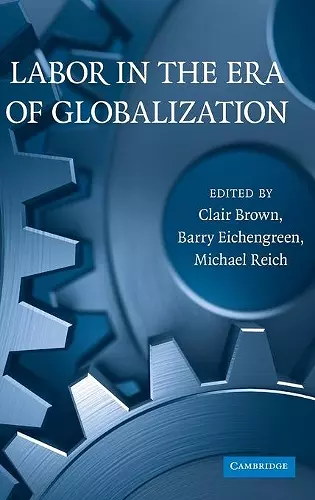Labor in the Era of Globalization
Barry J Eichengreen editor Clair Brown editor Michael Reich editor
Format:Hardback
Publisher:Cambridge University Press
Published:23rd Nov '09
Currently unavailable, and unfortunately no date known when it will be back

Analyzes the causes of the decline in labor's global fortunes from 1975 to the 2000s.
The last quarter of the twentieth century was marked by increasing insecurity for workers in an era of globalization. In this volume, prominent scholars from the United States, Europe, and Japan analyze the causes of the decline in labor's global fortunes, including deregulation, technological change, and global competition.The third quarter of the twentieth century was a golden age for labor in the advanced industrial countries, characterized by rising incomes, relatively egalitarian wage structures, and reasonable levels of job security. The subsequent quarter-century has seen less positive performance along a number of these dimensions. This period has instead been marked by rapid globalization of economic activity that has brought increased insecurity to workers. The contributors to this volume distinguish four explanations for this historic shift. These include 1) rapid development of new technologies; 2) global competition for both business and labor; 3) deregulation of industry with more reliance on markets; and 4) increased immigration of workers, especially unskilled workers, from developing countries. In addition to analyzing the causes of these trends, the contributors also investigate important consequences, ranging from changes in collective bargaining and employment relations to family formation decisions and incarceration policy.
'The essays in this volume drill down below the surface to provide rich explanations for three decades of stagnant wages, rising inequality, and increasing income insecurity. Without ignoring the effects of globalization, immigration, deregulation, and weakening of employment protection, the authors introduce important new analyses that incorporate variously institutions and cultural norms or examine less-studied linkages such as the impact of financial deregulation on labor markets. This is an important book with fresh insights into the causes and consequences of these developments.' Eileen Appelbaum, Rutgers University
'Bringing together a stellar set of economists and political scientists, this collection weaves economic arguments together with a nuanced analysis of institutions and political choices to explain the unraveling of labor's gains since the mid-twentieth century. For anyone trying to understand, or do something about, the losses in income and security suffered by working people over the course of the last four decades, it will be an invaluable resource.' Peter Evans, University of California, Berkeley
'Labor in the Era of Globalization is an awesome mix of political economy and institutional labor economics that shows that institutions – from unions to political structures and from financial institutions to the family and to labor laws – are important determinants of economic outcomes. The book is filled with fascinating, insightful, and occasionally irritating analyses that have more to say about the macro- and microeconomics of labor than the past two to three decades of laissez-faire theorizing. The only thing missing is a health warning on the jacket: Right-wing ideologues, true believers in perfect markets, beware: reading can cause an apoplectic fit, clenched fists, or a primal scream.' Richard Freeman, Harvard University and NBER
'The uniqueness of this volume is that its research focus goes beyond the standard labor market approach of examining comparative advantages across countries as a key source of international differences of earnings, employment, and job security. In contrast, Labor in the Era of Globalization's emphasis on institutional arrangements provides a nuanced approach that allows for greater understanding of the differing labor market challenges that workers face in Europe, Asia, and the United States. Its topical coverage coupled with a dispassionate approach toward analysis suggests that this volume will generate great interest from practitioners in business, academia, labor, and government.' James Peoples, University of Wisconsin–Milwaukee
ISBN: 9780521195416
Dimensions: 235mm x 158mm x 35mm
Weight: 770g
476 pages